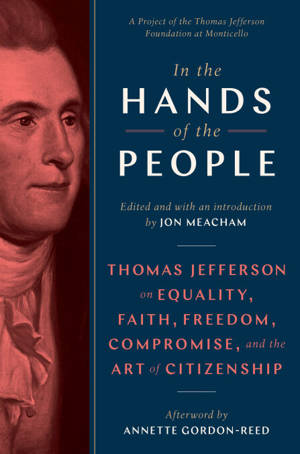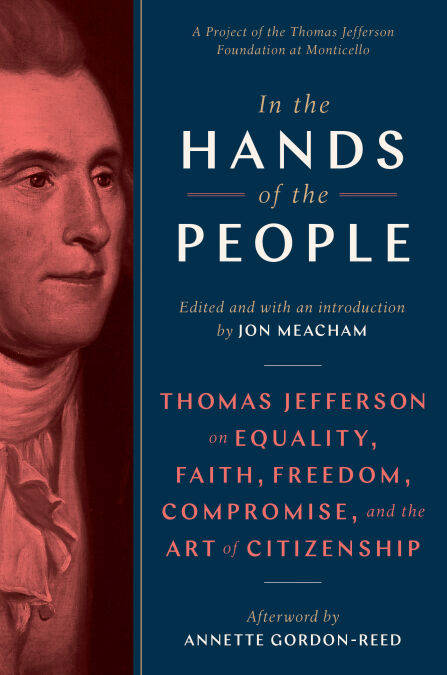
Bedankt voor het vertrouwen het afgelopen jaar! Om jou te bedanken bieden we GRATIS verzending (in België) aan op alles gedurende de hele maand januari.
- Afhalen na 1 uur in een winkel met voorraad
- In januari gratis thuislevering in België
- Ruim aanbod met 7 miljoen producten
Bedankt voor het vertrouwen het afgelopen jaar! Om jou te bedanken bieden we GRATIS verzending (in België) aan op alles gedurende de hele maand januari.
- Afhalen na 1 uur in een winkel met voorraad
- In januari gratis thuislevering in België
- Ruim aanbod met 7 miljoen producten
Zoeken
In the Hands of the People E-BOOK
Thomas Jefferson on Equality, Faith, Freedom, Compromise, and the Art of Citizenship
Annette Gordon-Reed
E-book | Engels
€ 8,09
+ 8 punten
Omschrijving
Pulitzer Prize–winning historian Jon Meacham offers a collection of inspiring words about how to be a good citizen, from Thomas Jefferson and others, and reminds us why our country’s founding principles are still so important today.
Thomas Jefferson believed in the covenant between a government and its citizens, in both the government’s responsibilities to its people and also the people’s responsibility to the republic. In this illuminating book, a project of the Thomas Jefferson Foundation at Monticello, the #1 New York Times bestselling author Jon Meacham presents selections from Jefferson’s writing on the subject, with an afterword by Pulitzer Prize–winning historian Annette Gordon-Reed and comments on Jefferson’s ideas from others, including Colin Powell, Madeleine Albright, Frederick Douglass, Carl Sagan, and American presidents.
This curated collection revitalizes how to see an individual’s role in the world, as it explores such Jeffersonian concepts as religious freedom, the importance of a free press, public education, participation in government, and others.
Meacham writes, “In an hour of twenty-first-century division and partisanship, of declining trust in institutions and of widespread skepticism about the long-term viability of the American experiment, it is instructive to return to first principles. Not, to be sure, as an exercise in nostalgia or as a flight from the reality of our own time, but as an honest effort to see, as Jefferson wrote, what history may be able to tell us about the present and the future.”
Thomas Jefferson believed in the covenant between a government and its citizens, in both the government’s responsibilities to its people and also the people’s responsibility to the republic. In this illuminating book, a project of the Thomas Jefferson Foundation at Monticello, the #1 New York Times bestselling author Jon Meacham presents selections from Jefferson’s writing on the subject, with an afterword by Pulitzer Prize–winning historian Annette Gordon-Reed and comments on Jefferson’s ideas from others, including Colin Powell, Madeleine Albright, Frederick Douglass, Carl Sagan, and American presidents.
This curated collection revitalizes how to see an individual’s role in the world, as it explores such Jeffersonian concepts as religious freedom, the importance of a free press, public education, participation in government, and others.
Meacham writes, “In an hour of twenty-first-century division and partisanship, of declining trust in institutions and of widespread skepticism about the long-term viability of the American experiment, it is instructive to return to first principles. Not, to be sure, as an exercise in nostalgia or as a flight from the reality of our own time, but as an honest effort to see, as Jefferson wrote, what history may be able to tell us about the present and the future.”
Specificaties
Betrokkenen
- Auteur(s):
- Uitgeverij:
Inhoud
- Aantal bladzijden:
- 128
- Taal:
- Engels
Eigenschappen
- Productcode (EAN):
- 9780593229323
- Verschijningsdatum:
- 29/06/2020
- Uitvoering:
- E-book
- Beveiligd met:
- Adobe DRM
- Formaat:
- ePub

Alleen bij Standaard Boekhandel
+ 8 punten op je klantenkaart van Standaard Boekhandel
Beoordelingen
We publiceren alleen reviews die voldoen aan de voorwaarden voor reviews. Bekijk onze voorwaarden voor reviews.









